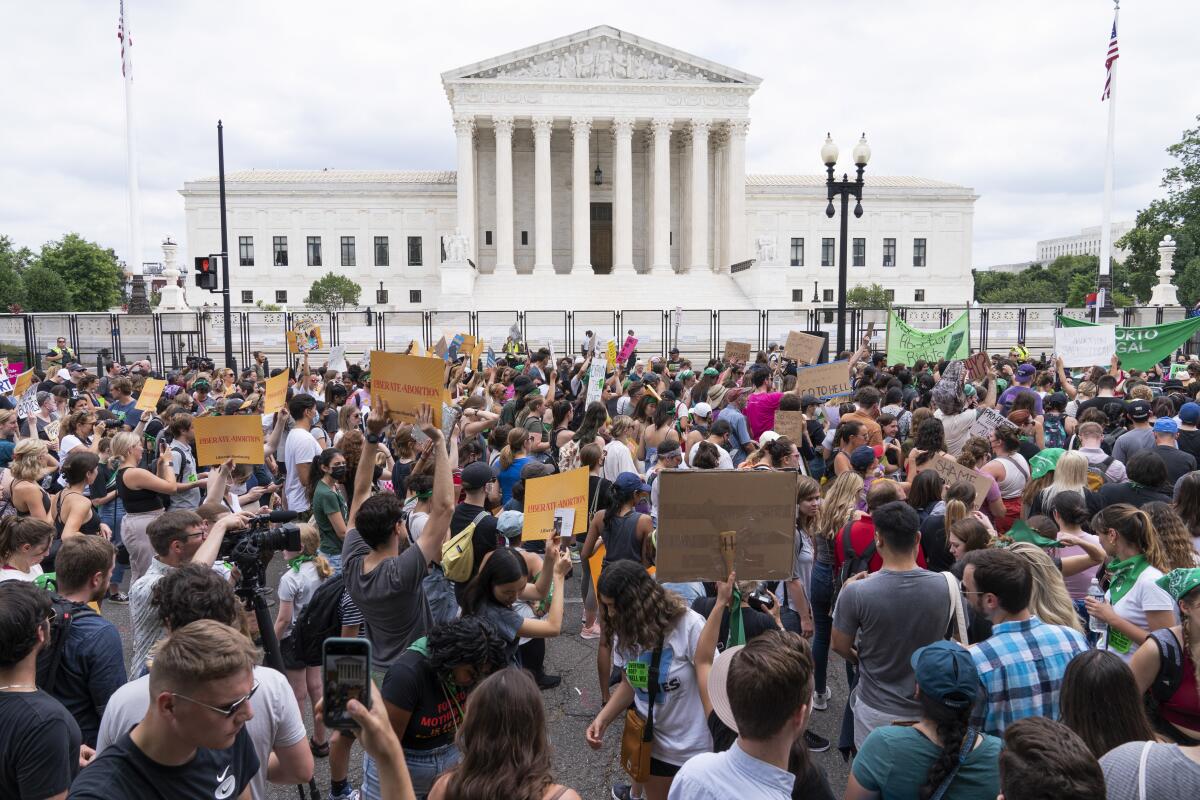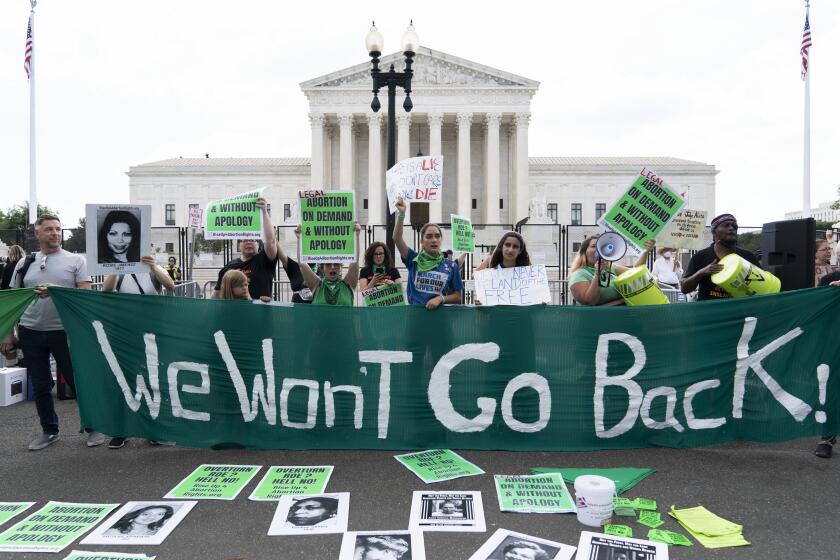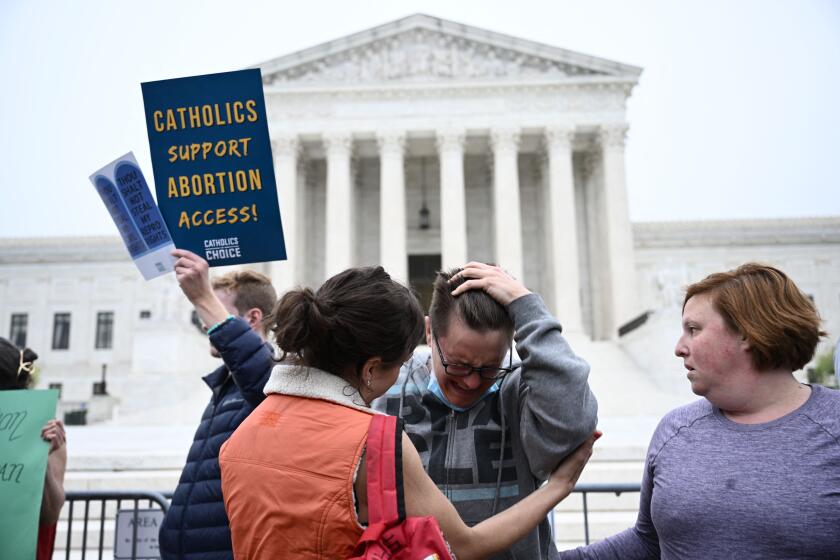Op-Ed: Ending Roe is a pure exercise of Republican power, wielded to reduce women’s freedom and equality

- Share via
Freedom and equality have expanded enormously over the course of American history, which makes the ending of a constitutional right virtually unprecedented.
In Dobbs vs. Jackson Women’s Health Organization, the court overruled a half-century of decisions protecting a constitutional right of women to choose whether to end their pregnancies. The decision must be understood as entirely about the conservative desire to end abortion rights and not about constitutional principles or judicial methodology.
There is a desire to think that law exists apart from the identity and ideology of the justices. But that is a myth when it comes to the Supreme Court. Its decisions always have been and always will be a product of the identity of those on the bench. For example, from the 1890s until 1936, the court had a very conservative majority and declared unconstitutional over 200 federal, state and local laws protecting workers and consumers. Only once in American history, during the Warren Court, from 1954-1969, and especially from 1962-1969, was there a liberal majority on the high court and its decisions were progressive in a way never otherwise seen in American history.
The maternal mortality rate for Black women is already three times as high as for white women. Expect that disparity to grow.
Roe vs. Wade was overruled not because of anything about its reasoning or any method of judicial interpretation but because Donald Trump won the presidency in 2016 and was able to appoint three justices to fulfill his promise to put on the court individuals who would end abortion rights.
These nominees had no compunction about lying during their confirmation hearings and pledging fidelity to precedent, and all have said that Roe is well-established precedent. They knew that once on the bench they could do what they wanted. Everyone knows that if Hillary Clinton had won in 2016 and picked three justices, Roe would have been safe for decades to come.
Justice Samuel Alito’s majority opinion in Dobbs focuses on the need to leave the issue of abortion to the political process. But there was no deference to the political process earlier this week when the conservatives on the court declared unconstitutional a New York law limiting concealed weapons that had been on the books since 1911 or struck down a Maine law that limited financial aid to religious schools. This conservative court defers to the political process when it agrees with its results, as it does with laws prohibiting abortions, but the deference vanishes when the conservative justices dislike the states laws.
Precedent and the principle of stare decisis are supposed to limit judicial discretion and provide stability to the law. But time and again, as in this decision, the conservative justices are willing to overrule the precedents they dislike.
They are motivated by carrying out the Republican platform, not a judicial philosophy or an interpretative methodology. The only question is how far they will go.
Since the draft decision leaked from the Supreme Court, experts have been debating how legal protections will change and what privacy rights could erode next.
The court’s ruling overturning the constitutional right for abortion is going to unleash a flurry of new state laws restricting reproductive rights. Right-wing politicians who have made abortion their central issue for years are not going to give up on it now that Roe has been overruled. A bill introduced in Missouri would make it a crime for a woman to leave the state for an abortion. States are sure to adopt laws to prohibit forms of contraception that take effect after conception, such as IUDs and the morning after pill. The court’s statements in Dobbs strongly indicate that the conservatives will uphold these laws.
Indeed, the court’s approach — saying that constitutional rights should be protected only if they are in the text of the Constitution or part of its original meaning or safeguarded by a long unbroken tradition — puts in jeopardy countless other liberties.
Already, conservative litigators have initiated cases to provide the Supreme Court a vehicle for overruling Obergefell vs. Hodges, its decision recognizing a constitutional right to marriage equality for gays and lesbians. A majority of the current justices disagree with that decision and they obviously seem unconstrained by precedent.
It is unclear what overruling Roe will mean for the court and its legitimacy. A Gallup poll in fall 2021 revealed the court having its lowest approval ratings in history, 40% approval and 53% disapproval. A new Gallup poll shows that only 25% of the American people have confidence in the Supreme Court, also a historic low.
What will it mean now that it has overruled a constitutional right supported by most Americans? As Justice Sonia Sotomayor asked at oral argument, how will the court survive the “stench” of this purely ideological ruling?
This, of course, is not the first time that the court has overruled a major precedent. Most famously, in Brown vs. Board of Education, in 1954, the court overruled the 58-year-old decision in Plessy vs. Ferguson, which had upheld laws requiring racial segregation and the doctrine of “separate but equal.” But Brown was a decision expanding equality and freedom and ultimately enhanced the court’s legitimacy.
The decision in Dobbs is a pure exercise of power, wielded to reduce freedom and equality — for women specifically. That the conservatives on the court cannot see the difference between Plessy and Roe shows how damaged that institution has become.
Every woman of reproductive age in the United States has spent her lifetime possessing a constitutional right that no longer exists. Women with unwanted pregnancies will continue to seek abortions. Some will still get them safely. Some will die or be maimed getting them unsafely. Some will have unwanted children.
All of this will happen — not because of any constitutional principle — but because a majority of the justices have decided they have unbridled power to govern the lives of Americans has they choose.
Erwin Chemerinsky is dean of the UC Berkeley School of Law and a contributing writer to Opinion. He is the author, most recently, of “Presumed Guilty: How the Supreme Court Empowered the Police and Subverted Civil Rights.”












